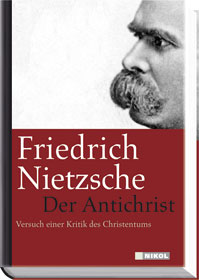 How can anyone still defer to the naïveté of Christian theologians these days when they decree that the development of the idea of God from the ‘God of Israel’, the god of a people, to the Christian God, the epitome of all goodness, counts as progress?
How can anyone still defer to the naïveté of Christian theologians these days when they decree that the development of the idea of God from the ‘God of Israel’, the god of a people, to the Christian God, the epitome of all goodness, counts as progress?
But even Renan does this. As if Renan had the right to naïveté! The opposite is what strikes the eye. When the presuppositions of ascending life, when everything strong, brave, domineering, and proud is eliminated from the idea of God, when he sinks little by little into the symbol of a staff for the weary, a life-preserver for the drowning, when he turns into the God of the poor, the sinners, the sickly, when the predicates of ‘saviour’ and ‘redeemer’ are the only ones left, the only divine predicates: what does this sort of transformation tell us?, this sort of diminution in the divine?
Of course: this will increase the size of ‘the kingdom of God’. God used to have only his people, his ‘chosen’ people. But then he took up travelling, just as his people did, and after that he did not sit still until he was finally at home everywhere, the great cosmopolitan, – until he had ‘the great numbers’ and half the earth on his side.
Nonetheless, the God of the ‘great numbers’, the democrat among gods, did not become a proud, heathen god: he stayed Jewish, he was still the cranny God, the God of all dark nooks and corners, of unhealthy districts the world over! His empire is as it ever was, an empire of the underworld, a hospital, a basement-kingdom, a ghetto-kingdom… [Editor’s bold-type above]